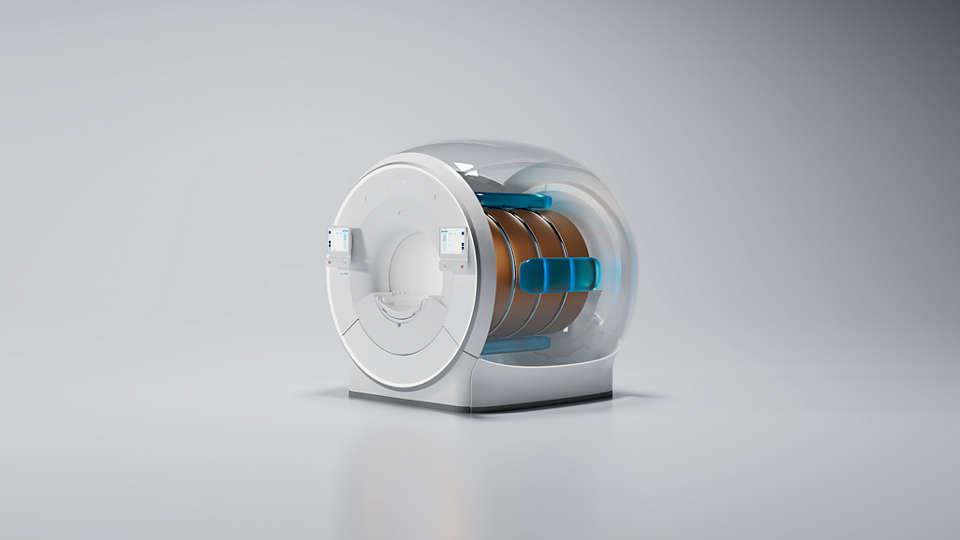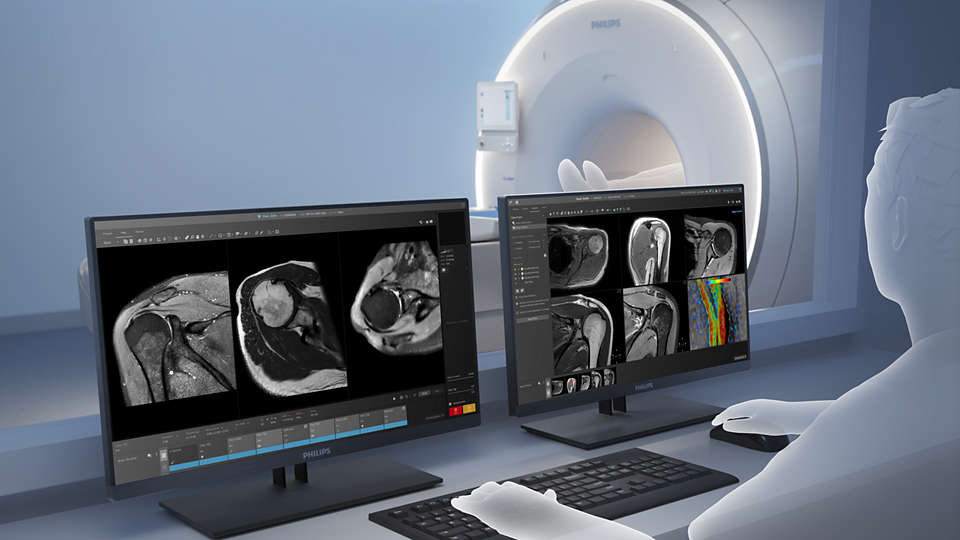Episode 1 - MRI Insights Series: Challenges in paediatric MRI
Presenter: Jeff Chen - MRI supervisor for the new Monash Children’s Hospital
Run through the unique challenges and solutions of paediatric MRI with Jeff Chen, Monash Children's Hospital MRI Supervisor 3.0T. Jeff talks about how parallel imaging and Compressed SENSE are game-changers in paediatric MRI, providing technicians with the capability to reduce scan time and increase scan clarity. Check out more information on the technology providing the best advantages in paediatric MRI at Philips MRI Systems and Solutions.
Share on social media
Episode 2: Compressed SENSE for paediatric MRI
Jeff Chen, Monash Children’s Hospital MRI Supervisor, highlights the three avenues for leading technology Compressed SENSE; resolution, scan time and scan range. Jeff details his experience using this technology with paediatric patients, including tips and tricks on where this technology can have the biggest impact. He says that with this technology, "the biggest problem our paediatric patients will face is – only watching 15 minutes of the movie". Check out more information on Compressed SENSE technology, providing the best advantages in paediatric MRI here.
Share on social media
Episode 3: The possibilities of foetal imaging
Jeff Chen, Monash Children’s Hospital MRI Supervisor, breaks down the technology to take on B1 homogeneity or the dielectric effect in foetal MRI. Innovative new solutions that can tackle the black band artifact, SAR and signal loss commonly associated with foetal MR are changing the imaging game. Similar to fishing, foetal MRI is possible but just takes a little bit of patience. Check out more information on foetal MR here.
Share on social media
Want to receive email notifications when the next video is released?
Want to receive email notifications when the next video is released?
Episode 4: Tips & Tricks for Turbo Spin Echo
Ben Kennedy, MRI Clinical and Research Director, explores Advanced TSE, the next level of Turbo Spin Echo (TSE) available across all the Philips platforms. Highlighting the differences between Advanced and the usual TSE, Ben explains where technicians can use this technology and which systems can seamlessly align to get the best outcomes. Ben also highlights the benefits of this technology, including shorter scan times, sharpness and clarity of pictures, lower SAR, constant signal, improvement in workflow and a decrease in physiological impacts from scans. He also explains some tips and tricks for scan parameters and usability to provide the best results. Learn more here.
Share on social media
Episode 5: MRI Insights Series: A 3D view of brachial plexus imaging
Delving into Philips NerveView, MRI Clinical and Research Director Ben Kennedy explores the challenges radiologists face with brachial plexus imaging. Check out his insights on how this technology can find subtle details in nerves and minimise issues with breathing and blood vessels. Learn more here.
Share on social media
Episode 6: MRI Insights Series: A 3D view of brachial plexus imaging
Deep dive into Compressed Sense with Ben Kennedy MRI Clinical and Research Director, learn some tips and tricks for getting the most out of your scans and how this technology pushes far beyond previous capabilities. Learn more here.
Share on social media
Episode 7: Spiral MR imaging
Learn more from Prof. Caroline Rae as she explores questions regarding the brain, central nervous system and imaging support research through Spiral MR imaging. Key challenges that are faced currently by imagers are related to imaging people who are less compliant due to the fact that patients with dementia, spinal cord injury and mental illness will need extra care to be comfortable. Check out how these challenges can be overcome through the use of a range of Philips tools which allows for the acquisition of more than one image at once, faster imaging processes and more signal to noise.
Share on social media
Episode 8: Conductivity maps in research and clinical applications
Join Prof. Caroline Rae as she discusses the use of Magnetic Resonance Electrical Properties Tomography (MREPT) in measuring intrinsic tissue conductivity. Conductivity imaging has become easier by having a balanced fast-field echo sequence, ultimately working to generate great phase maps. The benefits of tissue conductivity imaging can be seen as its versatility, not only in the detection of brain tumors and cancerous growths but also in imaging outside the brain, allowing for researchers to push imaging boundaries.
Share on social media
Episode 9: Hardware and software requirements in research imaging
Prof. Caroline Rae highlights the benefits of Philips’ MRI systems in helping researchers overcome their challenges whilst simultaneously achieving their imaging goals. Her choice of Philips MRI comes down to the depth of customization, control and flexibility available on the system, with a wide range of variables that can be changed easily. Discover how Philips MRI can improve and exceed upon imaging expectations.
Share on social media
Want to receive email notifications when the next video is released?
More in Radiology
Teaming up for success

Making AI feel natural for clinicians: Philips approach to integrated workflows

Survey cites enhanced patient experience and anxiety reduction as top benefits of Philips Ambient Experience

Philips and Disney join forces to improve the healthcare experience of children
Get to know the experts
Professor Caroline (Lindy) Rae
Professor Caroline (Lindy) Rae completed her PhD at The University of Sydney on magnetic resonance and metabolic control in the erythrocyte and then spent four years at the University of Oxford working on magnetic resonance and interdisciplinary brain research. This involved discovery of the first biochemical marker for intelligent behaviour as well as the first direct evidence for cerebellar dysfunction in dyslexia. Since returning to Australia, her research has focussed on determining the fascinating relationships between brain biochemistry and brain function. In addition to study of normal brain function her research also includes sleep disorders, addiction, pain, congenital disorders involving the brain and neurodegeneration/aging. She is also involved in the development of new magnetic resonance applications and analyses. Caroline Rae has published more than 130 research papers, including some that did not involve the use of magnetic resonance. Appointed to UNSW in 2005 as the Chair of Brain Sciences, she is the UNSW Node Director of the National Imaging Facility and Director (Research) at NeuRA Imaging. She is currently Secretary of the International Society for Neurochemistry, Associate Editor of Neurochemistry International and on the editorial board of Magnetic Resonance in Medicine. She was awarded the Medal of the Australian and New Zealand Society for Magnetic Resonance (2017) for outstanding contributions to magnetic resonance.

Ben Kennedy
Ben is currently the MRI Clinical and Research Director at Mermaid Beach Radiology. He has been an invited speaker at ISMRM, SMRT and ESMRB covering such topics as pulse sequence optimization, MRI physics and specialized clinical applications. Along with his current responsibilities at Mermaid Beach Radiology, Ben is also an Adjunct Lecturer at Griffith University and an Adjunct Research Fellow at the Menzies School of Health Research. The views and opinions expressed in the video are based on Ben’s professional experiences and are not intended to represent the views of his employers.

Jeff Chen
Jeff Chen is the MRI supervisor for the new Monash Children’s Hospital, which opened in 2017. He is passionate about providing the best care and experience for both parents and paediatric patients undergoing MRI scans. His recent use of Virtual Reality (VR) to reduce the fear of intravenous cannulation for children has awarded him the Monash Health Award and the Minister of Health State Award for the Improving Children’s Health Category in 2018. He looks forward to using new technologies to improve a child’s experience in Medical Imaging.

Learn more about our solutions
Discover unique MRI technologies that increase Radiology productivity, while delivering exceptional imaging quality and patient experience.
-
Transition your department to more productive helium-free MR operations.
Learn more -
This breakthrough acceleration technique shortens single MRI sequences and full MRI examinations.
Learn more -
Discover how you can support your staff with a workflow solution that allows them to focus less on technology and more on the patient while achieving high productivity.
Learn more -
![MR in radiotherapy]()
Our product solutions and support options for successful clinical implementation.
Learn more -
-
![MR Neuro applications]()
-
![dStream]()
-
![MR patient preparation]()
Prepare your patients on their MRI exam with the power of virtual reality.
Learn more

















